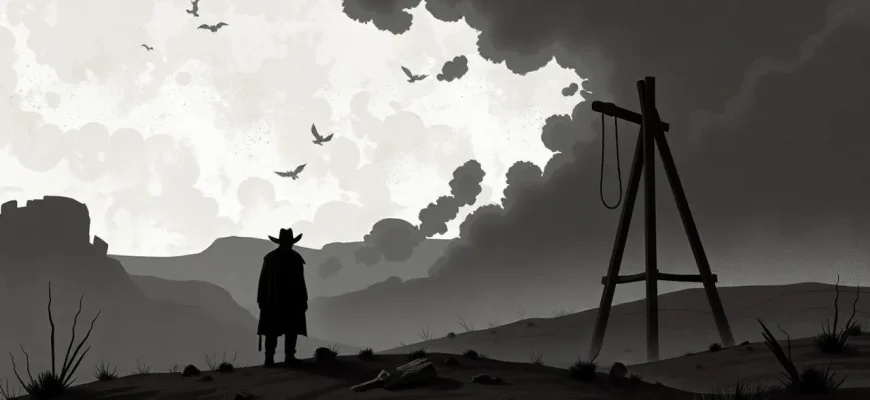The Wild West, often romanticized for its lawlessness and rugged individualism, can also be a setting for some of the most harrowing tales of human endurance and cruelty. This collection of Western films delves into the darker side of frontier life, where torture becomes a grim reality. From revenge-driven plots to survival stories, these movies showcase the harshness of the era, offering viewers a raw, unfiltered look at the human capacity for both suffering and inflicting pain. Here are ten films that capture this intense theme, each with its unique take on the subject.

The Great Silence (1968)
Description: This Spaghetti Western includes scenes of torture as part of the harsh environment of the snowy Utah territory, where a mute gunslinger fights against a ruthless bounty hunter.
Fact: The film was directed by Sergio Corbucci, known for his darker, more cynical take on the Western genre. It was banned in some countries for its bleak ending.
 Watch Now
Watch Now 
The Outlaw Josey Wales (1976)
Description: This classic Western includes scenes where the protagonist, Josey Wales, endures and inflicts torture as he seeks revenge against those who wronged him.
Fact: The film was directed by and stars Clint Eastwood, who also contributed to the screenplay. It was one of the first films to use the Steadicam.
 Watch Now
Watch Now 
The Proposition (2005)
Description: Set in the Australian outback, this film explores the brutality of colonial justice, with torture scenes integral to the plot as a lawman forces a criminal to choose between his brothers.
Fact: The film was shot in the Flinders Ranges, South Australia, and features a haunting score by Nick Cave and Warren Ellis.
 Watch Now
Watch Now 
The Assassination of Jesse James by the Coward Robert Ford (2007)
Description: While not focusing on torture, the psychological torment and manipulation in this film are palpable, leading to the eventual betrayal and assassination of Jesse James.
Fact: The film was shot on location in Canada, with the crew building an entire town for authenticity. It also features a lengthy runtime of nearly three hours.
 Watch Now
Watch Now 
The Burrowers (2008)
Description: This horror-Western features a group of settlers searching for kidnapped women, only to encounter a tribe that uses torture as part of their ritualistic practices.
Fact: The film was shot in South Dakota, and its director, J.T. Petty, is known for his work in horror and science fiction.
 Watch Now
Watch Now 
The Revenant (2015)
Description: While not strictly a Western, this survival epic includes scenes of extreme physical endurance and torture, as Hugh Glass fights for survival after being left for dead.
Fact: The film was shot in harsh conditions, with temperatures dropping to -40°C. Leonardo DiCaprio ate raw bison liver for one scene.
 Watch Now
Watch Now 
Bone Tomahawk (2015)
Description: This horror-Western hybrid features a rescue mission that turns into a nightmare when the rescuers encounter a tribe of cannibalistic troglodytes, known for their brutal torture methods.
Fact: The film was shot in a very short time frame, with principal photography lasting only 21 days. It also features a mix of well-known and lesser-known actors.
 Watch Now
Watch Now 
The Salvation (2014)
Description: This Danish-American Western follows a Danish settler seeking revenge after his family is brutally murdered. The film includes scenes of torture as part of the protagonist's quest for justice.
Fact: The film was shot in South Africa, standing in for the American West. It also features a cameo by Mads Mikkelsen's brother, Lars Mikkelsen.
 Watch Now
Watch Now 
The Hateful Eight (2015)
Description: Quentin Tarantino's film is set during a blizzard in Wyoming, where a group of strangers take shelter in a stagecoach stopover. Torture and betrayal are central themes as the characters' true natures are revealed.
Fact: The film was originally intended to be a sequel to "Django Unchained." It was also released in a special roadshow version with an intermission.
 Watch Now
Watch Now 
Dead Man (1995)
Description: Jim Jarmusch's film includes scenes of psychological and physical torture as the protagonist, William Blake, navigates the surreal and brutal landscape of the American West.
Fact: The film was shot in black and white, and Johnny Depp's character is named after the poet William Blake, reflecting the film's thematic depth.
 30 Days Free
30 Days Free 








